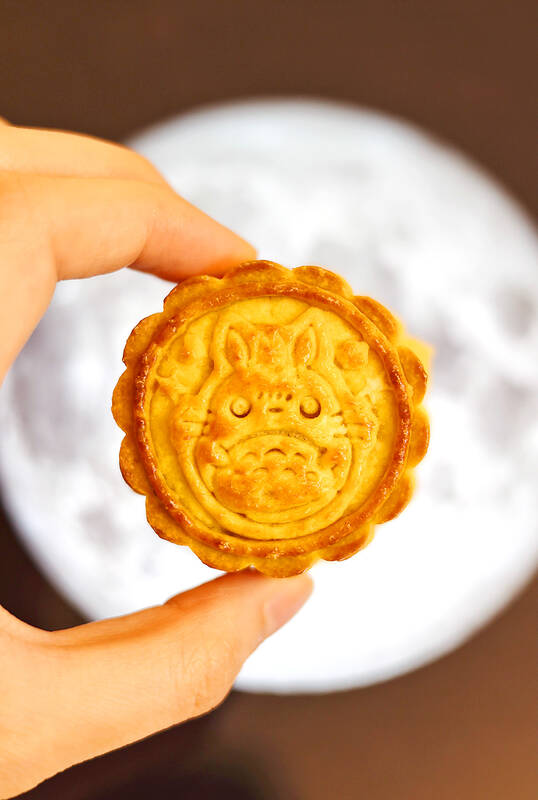對話 Dialogue
清清:明天就是中秋節了,你要不要回家跟家人一起過節?
Qīngqing:Míngtiān jiùshì Zhōngqiū jiéle, nǐ yào búyào huíjiā gēn jiārén yìqǐ guòjié?

Photo courtesy of Unsplash / 照片:Unsplash提供
華華:要啊!我很早就買好高鐵票了。中秋節是華人最重要的三大節之一,可以的話,一定要回家跟家人團聚的。
Huáhua:Yào a! Wǒ hěn zǎo jiù mǎi hào gāotiěpiàole. Zhōngqiū jié shì Huárén zuì zhòngyào de sān dà jié zhī yī,
kěyǐ dehuà, yídìng yào huíjiā gēn jiārén tuánjù de.
清清:我們家今年還是會烤肉,你們家呢?
Qīngqing: Wǒmen jiā jīnnián háishì huì kǎoròu, nǐmen jiā ne?
華華:我家從來不烤肉,只全家一起一邊賞月,一邊吃月餅和柚子,開開心心地聊一晚上的天。
Huáhua: Wǒjiā cónglái bù kǎoròu, zhǐ quánjiā yìqǐ yìbiān shǎng yuè, yìbiān chī yuèbǐng hàn yòuzi, kāikāixīnxīn de liáo yì wǎnshàng de tiān.
清清:蛤?中秋節烤肉是台灣特有的節慶文化,不烤好可惜。
Qīngqing: Há? Zhōngqiū jié kǎoròu shì Táiwān tèyǒu de jiéqìng wénhuà, bùkǎo hǎo kěxí.
華華:話雖如此,但大家都烤肉,引起的空氣污染,確實也是一大問題。
Huáhua:Huà suī rúcǐ, dàn dàjiā dōu kǎoròu, yǐnqǐ de kōngqì wūrǎn, quèshí yěshì yí dà wèntí.
清清:你真環保!那我今年少烤一點肉好了,留點肚子吃月餅跟柚子吧!中秋節快樂!
Qīngqing: Nǐ zhēn huánbǎo! Nà wǒ jīnnián shǎo kǎo yìdiǎn ròu hǎole, liú diǎn dùzi chī yuèbǐng gēn yòuzi ba!Zhōngqiū jié kuàilè!
翻譯 Translation
Qingqing: Tomorrow is the Mid-Autumn Festival. Are you going home to celebrate with your family?
Huahua: Yes! I bought a high-speed railway ticket a long time ago. The Mid-Autumn Festival is one of the three most important festivals for Chinese. If possible, you should definitely go home and get together your family.
Qingqing: We’re going to have a barbecue. What about your family?
Huahua: We never have a barbecue to celebrate the day. Instead, we gather as a family, admire the moon and enjoy mooncakes and pomelos. We spend a joyful evening together.
Qingqing: What? Barbecuing during the Mid-Autumn Festival is a unique festival cultural event in Taiwan. It’s a pity not to do it.
Huahua: That may well be true, but the air pollution caused by everyone barbecuing is a big issue.
Qingqing: You’re really environmentally aware! I’ll have less barbecue this year and save some space in my stomach for mooncakes and pomelos. Happy Mid-Autumn Festival!
生詞 Vocabulary
1. 中秋節 (Zhōngqiū jié) Mid-Autumn Festival
2. 高鐵 (gāotiě) high-speed railway
3. 團聚 (tuánjù) reunion, get together
4. 烤肉 (kǎoròu) barbecue
5. 月餅 (yuèbǐng) mooncake
6. 柚子 (yòuzi) pomelo
7. 話雖如此 (huà suī rúcǐ) that may well be true, but.../ having said that
8. 空氣污染 (kōngqì wūrǎn) air pollution
教材音檔 Audio Files
國立清華大學華語中心提供
By National Tsing Hua University Chinese Language Center:

In an effort to fight phone scams, British mobile phone company O2 has introduced Daisy, an AI designed to engage phone con artists in time-wasting conversations. Daisy is portrayed as a kindly British granny, exploiting scammers’ tendency to target the elderly. Her voice, based on a real grandmother’s for authenticity, adds to her credibility in the role. “O2” has distributed several dedicated phone numbers online to direct scammers to Daisy instead of actual customers. When Daisy receives a call, she translates the scammers’ spoken words into text and then responds to them accordingly through a text-to-speech system. Remarkably, Daisy

Bilingual Story is a fictionalized account. 雙語故事部分內容純屬虛構。 Emma had reviewed 41 resumes that morning. While the ATS screened out 288 unqualified, she screened for AI slop. She could spot it a mile away. She muttered AI buzzwords like curses under her breath. “Team player.” “Results-driven.” “Stakeholder alignment.” “Leveraging core competencies.” Each resume reeked of AI modeling: a cemetery of cliches, tombstones of personality. AI wasn’t just changing hiring. It was draining the humanity from it. Then she found it: a plain PDF cover letter. No template. No design flourishes. The first line read: “I once tried to automate my

Every May 1, Hawaii comes alive with Lei Day, a festival celebrating the rich culture and spirit of the islands. Initiated in 1927 by the poet Don Blanding, Lei Day began as a tribute to the Hawaiian custom of making and wearing leis. The idea was quickly adopted and officially recognized as a holiday in 1929, and leis have since become a symbol of local pride and cultural preservation. In Hawaiian culture, leis are more than decorative garlands made from flowers, shells or feathers. For Hawaiians, giving a lei is as natural as saying “aloha.” It shows love and

1. 他走出門,左右看一下,就過了馬路。 ˇ He walked outside, looked left and right, and crossed the road. χ He walked outside and looked left and right, crossed the road. 註︰並列連接詞 and 在這句中連接三個述語。一般的結構是 x, y, and z。x and y and z 是加強語氣的結構,x and y, z 則不可以。 2. 他們知道自己的弱點以及如何趕上其他競爭者。 ˇ They saw where their weak points lay and how they could catch up with the other competitors. χ They saw where their weak points lay and how to catch up with the other competitors. 註:and 一般連接同等成分,結構相等的單詞、片語或子句。誤句中 and 的前面是子句,後面是不定詞片語,不能用 and 連接,必須把不定詞片語改為子句,and 前後的結構才相等。 3. 她坐上計程車,直接到機場。 ˇ She took a cab, which took her straight to the airport. ˇ She took a cab and it took her straight